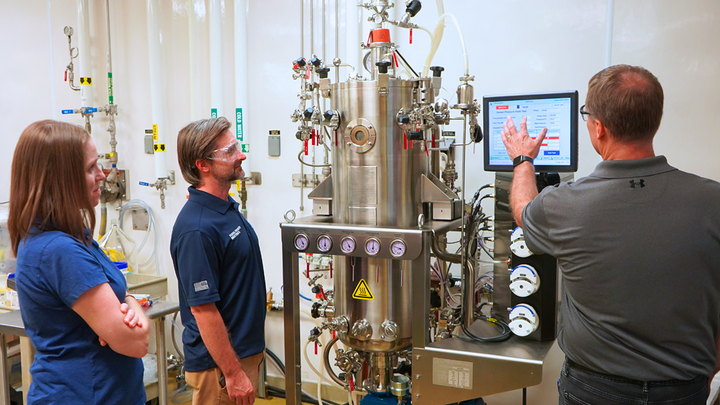Four faculty in the College of Engineering – George Hunt, Shuai Nie, Massimiliano Pierobon and Jamilla Teixeira – are serving as the inaugural cohort of fellows in the Scholarship of Engagement Fellows Program.
The College Outreach and Engagement Committee (COEC), led by Kim Wilson, special assistant to the dean and professor of landscape architecture, awarded the two-year fellowships, which run through January 2027, to assist faculty in developing projects that connect with communities and individuals across Nebraska.
Over the next two years, the fellows will receive $4,000 in stipends to assist their projects.
A rural tour of northeast Nebraska is scheduled for May 28 – 30 for the fellows, including engagement opportunities with leaders in Norfolk, South Sioux City, Niobrara, Ord and North Platte.
They will also work with a faculty mentor, complete a scholarly paper on the project, attend workshops, be involved in the 2025 Fall COE Engagement Forum and assist in mentoring future fellow cohorts.
The projects include:
George Hunt, associate professor of practice in civil and environmental engineering, plans to involve engineering students in full-year senior design capstone courses aimed at helping the Village of Niobrara with multiple projects needing engineering expertise. These could include preliminary estimates and designs for alternative routes for truck traffic through the town, relocation of two lagoons near the Niobrara River and addressing the village’s need for drinking water treatment, including elevated levels of manganese.
“I have been actively engaged with communities in Nebraska in several courses for the past five years, and I strongly believe that engaged teaching helps everyone –students and community,” Hunt said. “Students will work on something real that people in Nebraska need, and in turn they understand what civil engineers can do for communities to make people’s lives better.”
Shuai Nie, assistant professor in the School of Computing, will partner with NUtech Ventures and Nebraska 4-H to organize workshops on technology transfer and commercialization of research ideas with engineering students and will join with Nebraska 4-H and Girls Code Lincoln to develop an extension program with in-semester coding camps for middle-school students in rural communities across the state.
“The goal I hope to achieve through this program is to foster stronger connections between academia and the broader community in rural Nebraska, and making sure that engineering knowledge is accessible, relevant and beneficial to our stakeholders,” Nie said. “I want to encourage more students, especially female students, to explore careers in STEM and see themselves as future leaders who will shape a better world.”
Massimiliano Pierobon, Susan J. Rosowski Associate Professor in the School of Computing, plans to continue developing a National Science Foundation Center proposal to design and implement computational frameworks that can produce accessible mental health tools across the state, especially in rural communities. He will partner with Nebraska Extension and Rural Prosperity Nebraska, Southeast Community College, Nebraska College of Technical Agriculture and UNL’s Osher Lifelong Learning Institute.
“Engagement with Nebraska communities is essential to my work, particularly in ensuring that our bio-inspired and human-centered technologies are grounded in real-world needs and designed for real-world applications,” Pierobon said. “Engaging with local stakeholders - such as farmers, educators, mental health professionals, and policymakers - allows us to co-create technologies that are not only innovative but also culturally and practically relevant.”
Jamilla Teixeira, assistant professor of civil and environmental engineering, will focus on the use of waste plastics as a sustainable infrastructure material – such as incorporating plastic samples into asphalt mixtures and concrete – with the goal of reducing landfill waste, improving material performance and adding to the state’s recycling strategies. This project would include partnerships with recycling companies, industry contractors and city administrators and the Nebraska Department of Transportation.
“As a researcher dedicated to the intersection of civil engineering and environmental sustainability, this program offers an invaluable opportunity to bridge academic research and societal impact,” Teixeira said. “By focusing on sustainable infrastructure solutions, I seek to advance innovative practices while addressing critical environmental challenges, particularly solid waste management.”
Wilson said the college’s program is a commitment to making engagement a priority, as the University of Nebraska has in its most recent strategic plan, and to be a “game-changer” across the state.
“The idea of engagement is not new, it’s been around for years,” Wilson said. “We’re trying to integrate it into the fabric of this college in a very convincing way.
“We’re the only College of Engineering in the state and, economically, we need to have impact across the state,” Wilson said. “We can do that by reaching out and involving high schools, industry, communities and individuals. That then translates into teaching and learning and research and, just as importantly, service."




